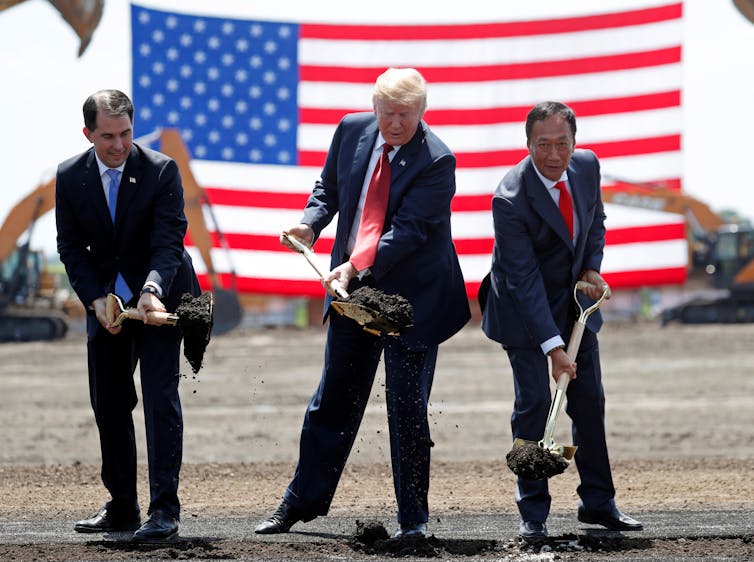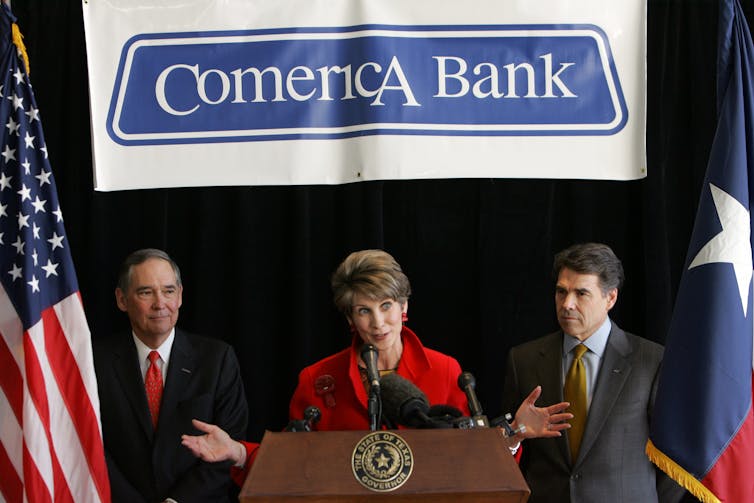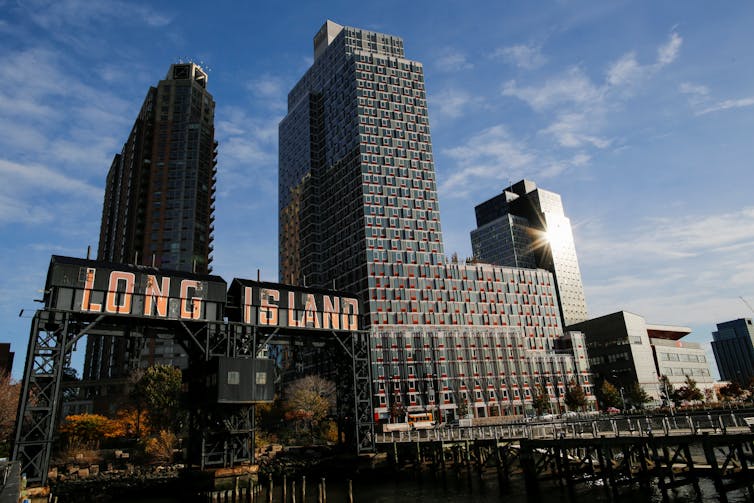Amazon HQ2: Texas experience shows why New Yorkers should be skeptical
- Written by Nathan Jensen, Professor of Government, University of Texas at Austin
New York offered Amazon close to US$3 billion[1] to build a “second” headquarters in Long Island City on the promise of 25,000 jobs.
Since the deal was joyfully announced[2] in November, however, many local residents and some politicians[3] in the area have been questioning whether it’s worth it, both in terms of the price tag and the impact on housing and traffic congestion. There’s now a real possibility that the deal could be blocked[4].
The research[5] supports those who question the wisdom[6] of cities and states incentivizing economic development. Studies suggest the jobs and economic gains are usually not worth the tax breaks since the majority of companies[7] would have come even without incentives.
And that’s when the companies try to live up to the promises they made. They don’t always do so, with the latest example being Foxconn’s announcement that it is reconsidering plans to build a factory in Wisconsin[8] – less than a year after agreeing to create up to 13,000 high-tech jobs in exchange for more than $4.5 billion in incentives.
But how often do companies that agree to build factories and create jobs in exchange for economic incentives back away from their promises? And when they do, do taxpayers ever learn about it?
To shine light on these questions, we conducted a study[9] of a Texas economic development program. Taxpayers in any American city considering luring a company with cash should take heed.
 Trump takes part in a groundbreaking with Wisconsin Gov. Scott Walker and Foxconn Chairman Terry Gou.
Reuters/Kevin Lamarque[10]
Trump takes part in a groundbreaking with Wisconsin Gov. Scott Walker and Foxconn Chairman Terry Gou.
Reuters/Kevin Lamarque[10]
Something to hide?
The Texas Enterprise Fund[11], which started in 2003, allows the state to offer cash grants to companies in exchange for promises of investments and job creation. As of Jan. 1, the program[12] had provided over $600 million in cash incentives to companies vowing to create over 94,000 direct jobs in Texas.
In our study[13], we submitted public records requests for company applications and agreements for grants. We wanted to see what companies had promised the state in return for the cash.
Our research led to two troubling findings. First, public record law in Texas allows companies themselves to legally challenge requests[14] – which is controversial yet not uncommon among other states.
In our study, 42 out of the 165 recipient companies submitted legal challenges to our requests. Before even seeing the data, we were asking ourselves: What are these companies trying to hide?
Although companies were partially successful in limiting our requests, primarily in getting certain parts of their proposals redacted, the governor’s office ultimately provided us with a complete list of companies that had some amendment to their contracts.
To our surprise, over a quarter of companies in the program – or 46 – had renegotiated their incentive deals with the state. These deals weren’t announced by the governor’s office nor were they reported anywhere online.
Our public records request is still unfolding and we still haven’t received the contracts for roughly two-thirds of these companies. For the 63 companies whose contracts we received, 29 had amendments to the original.
 Comerica Inc. announced plans in 2007 to relocate its corporate headquarters to Dallas.
AP Photo/LM Otero[15]
Comerica Inc. announced plans in 2007 to relocate its corporate headquarters to Dallas.
AP Photo/LM Otero[15]
SpaceX and Comerica
Most of these amended contracts were designed to reduce companies’ commitments to job creation. Two cases in point are SpaceX and Comerica.
SpaceX – a company that designs, manufactures and operates commercial spacecraft – received a $2.3 million grant[16] in 2013 in exchange for a commitment to create 300 jobs at a new launch facility near Brownsville, Texas. In 2017, however, the company secretly renegotiated its grant contract to halve the size of the deal: SpaceX would reduce its commitment to 150 new jobs in return for a grant of $1.15 million. The situation is still a mystery, however, because the fund hasn’t paid any funds nor has SpaceX reported jobs as part of the program.
Comerica received $3.5 million[17] in 2007 in exchange for its commitment to create 200 jobs as part of its plan to move its headquarters to Dallas from Detroit. In 2012, the financial services giant amended the contract to allow 15 of its current executives – including the CEO – to be counted towards the job and wage target as long they relocated to Texas.
In case after case, companies renegotiated grant contracts in similar ways to get a better deal, all while avoiding public scrutiny. In contrast, announcements of the original agreements were typically covered as big events and photo ops[18], such as when former Texas Gov. Rick Perry and SpaceX founder Elon Musk broke ground[19] together.
 Amazon is reportedly considering setting up headquarters in Gantry Plaza State Park.
Reuters/Eduardo Munoz[20]
Amazon is reportedly considering setting up headquarters in Gantry Plaza State Park.
Reuters/Eduardo Munoz[20]
Empty promises
Perhaps most disturbingly, our two findings – company challenges and renegotiations – were related.
We found that companies that had renegotiated their contracts were much more likely to have challenged our public records request, at almost double the rate.
This pattern is consistent with companies using public records laws[21] to hide their non-compliance with their job creation promises.
The finding, even if limited to a single state, is troubling. If companies can not only secretly renegotiate the deals but also make sure that public records laws shield them from revealing that they did, then the contracts are meaningless. And we would argue that politicians are at the very least complicit with these private deals.
In the cases of New York and Virginia – the other state that received a new Amazon location as a part of its “HQ2” bidding process – the agreements they signed requires them to notify the online retailer[22] of any public records requests in order to give it the opportunity to legally challenge them.
More broadly, secrecy pervades the entire process of economic development. For example, during the many months-long competition to win HQ2, Wisconsin officials purposely routed their Amazon bid through agencies not subject to public records requests, emails show[23]. And cities like Austin and Los Angeles submitted their bids[24] through non-public entities like the Chambers of Commerce as a way to shield them from public scrutiny.
When public records aren’t public
Throughout the country we have observed[25] exceptions to public records laws and “creative” ways government official can circumvent these laws.
And the costs of this lack of transparency can be high, as audits of economic development programs in New Jersey[26] and New York[27] show.
The scathing audit of New York’s Excelsior Jobs Program found not only a lack of due diligence but also a staff that had changed the required number of jobs for companies that were falling short of their creation requirements. And this program happens to also be providing much of the incentives for Amazon’s HQ2[28].
In other words, after politicians stage photo ops[29] of company announcements, little is done to make sure companies are complying with these agreements.
Will New York also fail to hold Amazon accountable if it doesn’t live up to its commitments? The evidence doesn’t offer much reason for optimism.
References
- ^ close to US$3 billion (ny.curbed.com)
- ^ joyfully announced (www.politico.com)
- ^ local residents and some politicians (www.geekwire.com)
- ^ deal could be blocked (www.nytimes.com)
- ^ research (www.cambridge.org)
- ^ supports those who question the wisdom (www.nytimes.com)
- ^ majority of companies (research.upjohn.org)
- ^ reconsidering plans to build a factory in Wisconsin (www.bloomberg.com)
- ^ study (equitablegrowth.org)
- ^ Reuters/Kevin Lamarque (pictures.reuters.com)
- ^ Texas Enterprise Fund (gov.texas.gov)
- ^ program (gov.texas.gov)
- ^ study (equitablegrowth.org)
- ^ legally challenge requests (www.star-telegram.com)
- ^ AP Photo/LM Otero (www.apimages.com)
- ^ received a $2.3 million grant (www.bizjournals.com)
- ^ $3.5 million (gov.texas.gov)
- ^ were typically covered as big events and photo ops (www.mysanantonio.com)
- ^ broke ground (www.spaceflightinsider.com)
- ^ Reuters/Eduardo Munoz (pictures.reuters.com)
- ^ companies using public records laws (equitablegrowth.org)
- ^ notify the online retailer (www.fastcompany.com)
- ^ emails show (www.bizjournals.com)
- ^ submitted their bids (www.muckrock.com)
- ^ we have observed (www.nytimes.com)
- ^ New Jersey (www.state.nj.us)
- ^ New York (www.osc.state.ny.us)
- ^ much of the incentives for Amazon’s HQ2 (blog.aboutamazon.com)
- ^ photo ops (www.roanoke.com)
Authors: Nathan Jensen, Professor of Government, University of Texas at Austin

